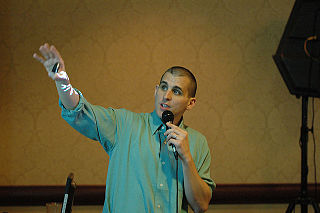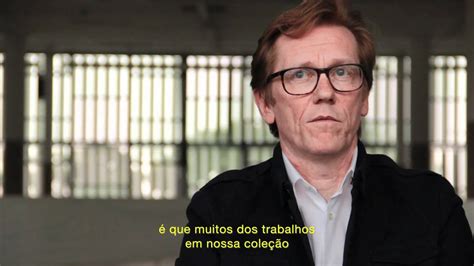A Quote by Scott Berkun
For centuries before Google, MIT, and IDEO, modern hotbeds of innovation, we struggled to explain any kind of creation, from the universe itself to the multitudes of ideas around us. While we can make atomic bombs, and dry-clean silk ties, we still don't have satisfying answers for simple questions like: Where do songs come from? Are there an infinite variety of possible kinds of cheese? How did Shakespeare and Stephen King invent so much, while we're satisfied watching sitcom reruns? Our popular answers have been unconvincing, enabling misleading, fantasy-laden myths to grow strong.
Quote Topics
Answers
Any
Around
Atomic
Atomic Bomb
Been
Before
Bombs
Centuries
Cheese
Clean
Come
Creation
Did
Dry
Enabling
Explain
Fantasy
Google
Grow
How
Ideas
Infinite
Innovation
Invent
Itself
Kind
Kinds
King
Like
Make
Misleading
MIT
Modern
Much
Multitudes
Myths
Our
Popular
Possible
Questions
Reruns
Satisfied
Satisfying
Shakespeare
Silk
Simple
Sitcom
Songs
Stephen King
Still
Strong
Struggled
Ties
Universe
Us
Variety
Watching
While
Related Quotes
While testimonies can come as dramatic manifestations, they usually do not. Sometimes people think they need to have an experience like Joseph Smith's vision before they gain testimonies. If we have unrealistic expectations of how, when, or where answers come, we risk missing the answers which come as quiet, reassuring feelings and thoughts that most often come after our prayers, while we are doing something else. These answers can be equally convincing and powerful.
It's perfectly clear to me that religion is a myth. It's something we have invented to explain the inexplicable. My religion and the spiritual side of my life come from a sense of connection to the humankind and nature on this planet and in the universe. I am in overwhelming awe of it all: It is so fantastic, so complex, so beyond comprehension. What does it all mean -- if it has any meaning at all? But how can it all exist if it doesn't have some kind of meaning? I think anyone who suggests that they have the answer is motivated by the need to invent answers, because we have no such answers.
There are two questions that get to us all: Are we alone in the Universe? And, where did we come from? For me, science provides a much more satisfactory way to seek answers than does any religion I've come across. With that said, the universe is mysterious and wonderful. It fills me with reverence for nature and our place among the stars; our place in space.
There's a shift of these young artists who have been brought up, educated, with these media around them. If you have a question, if you have a doubt, you go to the Internet, for example. And you will get thousands of answers to your questions. All of this will proliferate more kinds of questions and more kinds of answers.
Philosophy is to be studied, not for the sake of any definite answers to its questions, since no definite answers can, as a rule, be known to be true, but rather for the sake of the questions themselves; because these questions enlarge our conception of what is possible, enrich our intellectual imagination and diminish the dogmatic assurance which closes the mind against speculation; but above all because, through the greatness of the universe which philosophy contemplates, the mind is also rendered great, and becomes capable of that union with the universe which constitutes its highest good.
Myths, whether in written or visual form, serve a vital role of asking unanswerable questions and providing unquestionable answers. Most of us, most of the time, have a low tolerance for ambiguity and uncertainty. We want to reduce the cognitive dissonance of not knowing by filling the gaps with answers. Traditionally, religious myths have served that role, but today — the age of science — science fiction is our mythology.
Can we afford clean water? Can we afford rivers and lakes and streams and oceans which continue to make possible life on this planet? Can we afford life itself? Those questions were never asked as we destroyed the waters of our nation, and they deserve no answers as we finally move to restore and renew them. These questions answer themselves.
We still like to make up stories, just as our ancestors did, which use personification to explain the great forces of our existence. Such stories, which explain how the world began or where the sun goes when it sets, we call myths. Mythology is a natural product of the symbolizing mind; poets, when not making up myths of their own, are still commanding ancient ones.
I roamed the countryside searching for the answers to things I did not understand. Why shells existed on the tops of mountains along with the imprints of coral and plant and seaweed usually found in the sea. Why the thunder lasts a longer time than that which causes it and why immediately on its creation the lightening becomes visible to the eye while thunder requires time to travel. How the various circles of water form around the spot which has been struck by a stone and why a bird sustains itself in the air. These questions and other strange phenomena engaged my thought throughout my life.


































